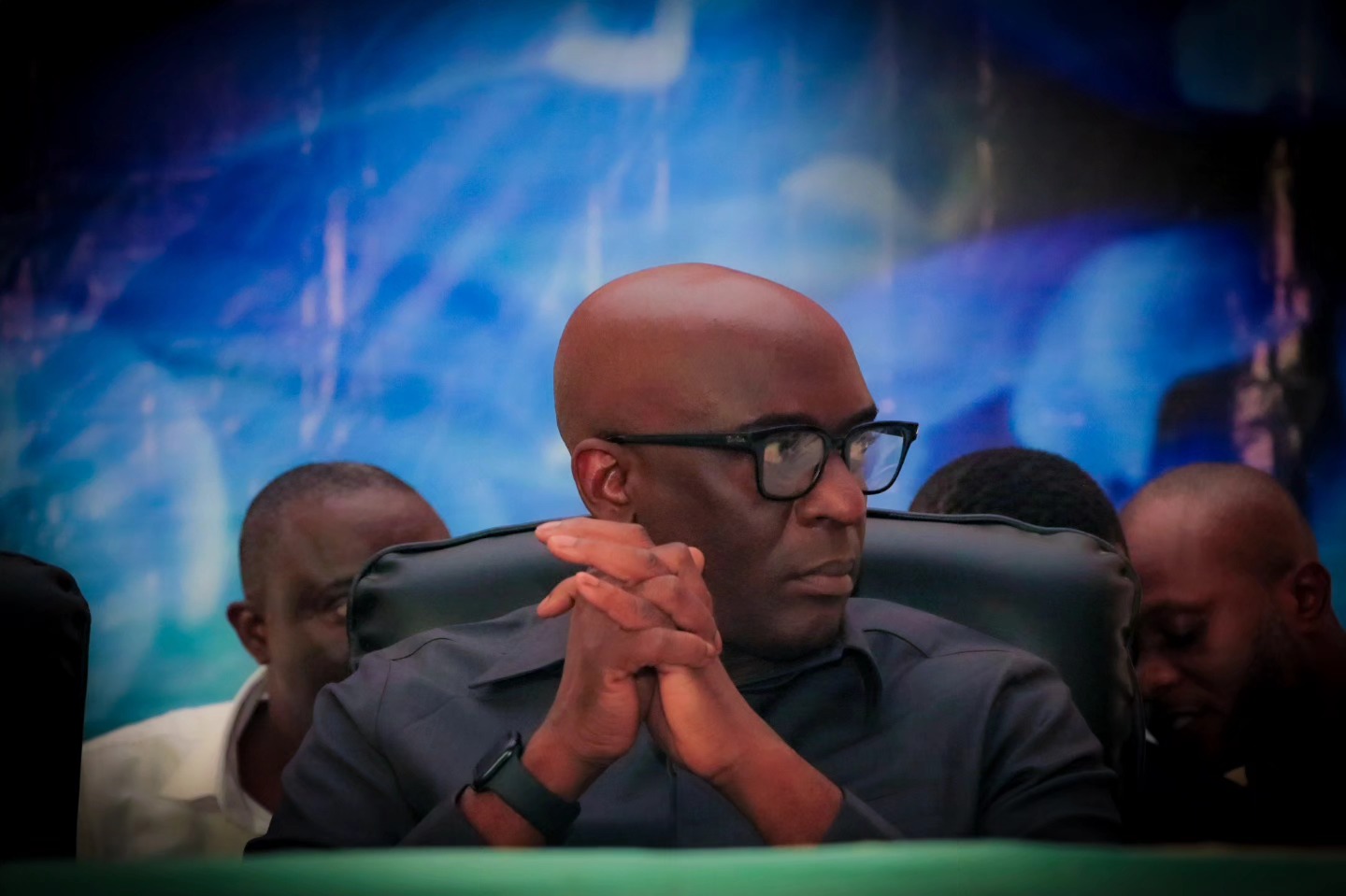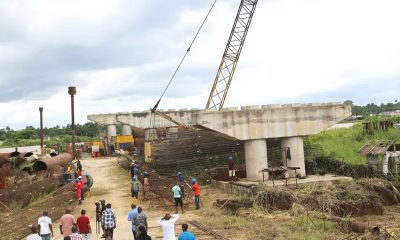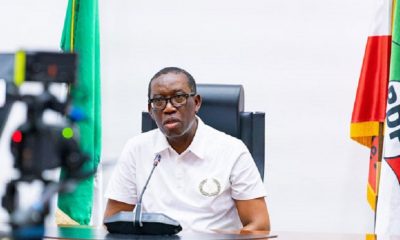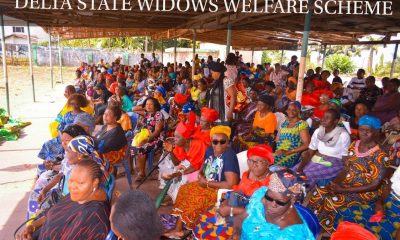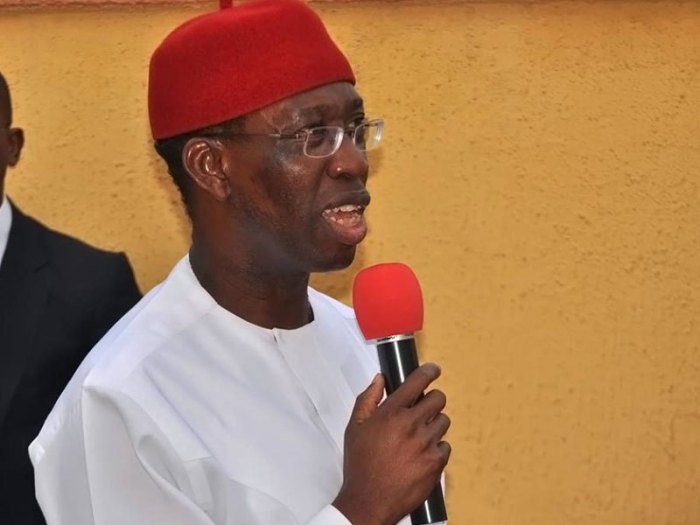Feature/OPED
Okowa, Leadership Capacity and the Ignorance of a Commentator
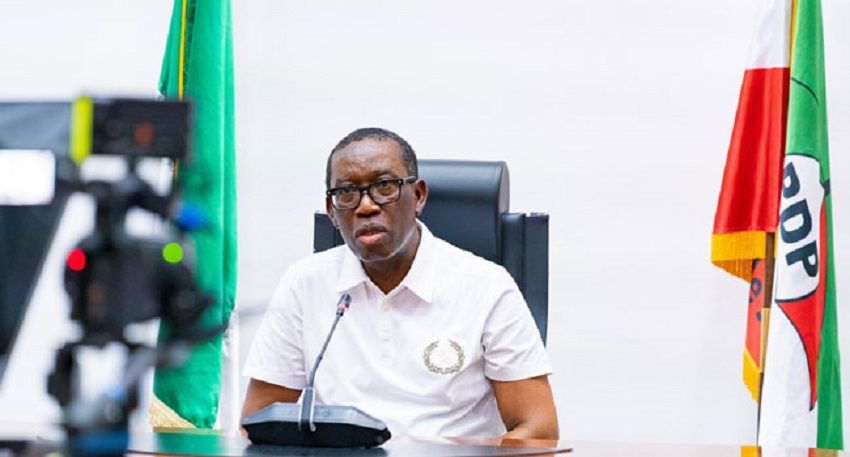
By Jerome-Mario Chijioke Utomi
One inherent ‘sorrow’ associated with public leadership across the globe is that once a citizen is elevated to such a position, either through election or appointment, he loses his/her right to private living.
Closely associated with this challenge is that such public offices, particularly in Nigeria, have lately become targets for fierce political and ideological warfare in ways that negate our rationality as human beings. And each time such ‘wars’ occur, great amounts of innocent human character are spilt, wars of words waged, countless souls and ambition persecuted and martyred.
Making it a reality to worry about is the new awareness that at very moments, it matters not whether the ‘embattled’ public official has demonstrated passion for his purpose, practised leadership values consistently, promoted social mobility, facilitated economic justice and led with his hearts as well as his heads.
There are countless examples but the first that understandably comes to mind is the recent comment by Frank Tietie, lawyer and public affairs commentator on an Arise TV programme on Monday, May 30, 2022.
The comment this time around was spewed at Ifeanyi Okowa, a former Commissioner in Delta State for eight years, one time/one term Secretary to the State Government, Senator and current Governor of the state.
Commenting on the strengths and weaknesses of some members of Peoples Democratic Party (PDP) being tipped as Vice Presidential candidate to the party’s presidential candidate who emerged on Saturday night, Mr Atiku Abubakar, when he got to Okowa for his assessment, he said that the Governor could not be the Vice Presidential candidate because he had not developed Delta State and that he lacked national exposure, among others.
Essentially, while he enjoys the right to comment on such public discourse, there was, however, an unwelcome departure from the normal good sense and judgment expected of such a ‘public forum’. The diatribe demonstrated how an unequipped and deformed public affairs commentator could easily morph into a political attack dog-promoting hatred and confusing malice with objectivity.
Aside from the visible departure from fact-based analysis, an action this piece believes was fired by asymmetrical political and economic understanding than a public good, it is important to expose the fundamental flaws in the basic argument projected by the said analyst/commentator-as they cannot hold water when faced with the embarrassing fact.
First and very fundamental, from Okowa’s achievements as Commissioner, SSG, Senator and Governor, it is factually supported that he is eminently qualified to be the nation’s president as his credential speaks volumes.
Take, as an illustration; is Frank Tietie unaware that Delta State under Okowa was ranked the Best State in Human Capital Development in the 2017 States Peer Review by the National Competitiveness Council of Nigeria? Is he unmindful of the fact that in 2020, Delta State was adjudged the Second Least Poor State, coming only after Lagos, Nigeria’s business hub, according to the Nigerian Bureau of Statistics (NBS)? Or is he denying the fact that the state is a microcosm of Nigeria because she is populated by different ethnic nationalities and has under previous administrations had inter-ethnic conflicts/clashes, fatal boundary disputes, especially over oil-bearing land, political tensions, high unemployment and poverty rates, which has all been tackled and sustainable peace restored in those troubled areas by the Okowa led administration?
How could these feats be possible if the state was not in the hands of dynamic leadership that is exceptionally good at painting a clear vision that inspires and motivates his populace? If the state government has not performed as alleged, how come sustainable peace has endured in the state?
While an answer to the above is being awaited, this piece must elicit other examples to consolidate claims on Okowa’s performance.
The Asaba Airport, for example, was downgraded just before the Governor assumed office. Today, the same airport is now a category 6 airport that receives international flights; the airport is now a major national carrier’s hub in the South-East and South-South geo-political zones. The same goes with the Osubi Air in the Warri part of the state.
In the area of education, separate from three new universities Okowa recently incubated, nurtured and established in the state, evidence abounds that as a result of the work of the Technical and Vocational Education Board in conjunction with the supervising Ministry of Basic and Secondary Education in the state, six technical colleges in Agbor, Sapele, Ofagbe, Utagba-Ogbe, Ogor and Issele-Uku have been fully rehabilitated, well equipped and fully functional.
Consequently, Delta State is the first state in the country to have all of the courses offered by its technical colleges accredited by the National Board for Technical Education (NBTE).
In a similar experience, during a media interview with a coastal dweller in the state, he, with excitement, noted thus; the age-long excuse by previous administrations that the coastal region cannot be developed because the terrain is a marshy-a feature that renders construction difficult if not impossible, can no longer be sustained, adding that the Governor being a God sent, used his politics of development to send such an excuse to the dustbin of history. The region, he added is now blessed with an appreciable level of good/internal road networks and other infrastructural development- a feat that qualifies the Governor as the first to give a sense of belonging to the people of the region.
With this development, the people of the region he added seem certain to make an increasing contribution to the development of the state as a handful of them can now afford the luxury of education and access to good amenities. It is clear in hindsight that the Governor’s effort will not only give the people a sense that they have a governor that cares but act as a technique to support the people to understand the Governor’s vision, he concluded.
At the national level, the achievement of Governor Okowa stands tall.
A while ago, he identified the absence of a national ideology that all the component parts of the country subscribe to as the crux of the matter of why we are yet to forge that sense of oneness and unity. In the absence of a shared national vision or aspiration, primordial loyalties and sentiments largely hold sway among the citizens.
Before the dust of appreciation, analysis and commendation elicited by such objective declaration could settle, another was up. This time around, the Governor called for a new constitution in the country, lamenting that the lack of political will to devise a constitution that supports true federalism will prevent the nation from moving forward.
In his words, “The 1999 Constitution (as amended) centralises political and economic powers in the federal government and emasculates the states by denying them powers to secure their own territories and control their natural resources for the development of their territories and people.”
And as a man of peace and promoter of national unity, Okowa admitted that we are better and stronger together, and that, with appropriate, visionary leadership and good governance, we can turn our diversity into a great source of strength and a springboard to build a strong multi-ethnic and multi-religious country that will be the envy of other nations.
To catalyse the process of building a more united Nigeria, he underlined that the federal government must frontally and transparently tackle insurgency, banditry, kidnapping, criminal herdsmen operations and all purveyors of insecurity in a way to obviate the popular impression that they are executors of a pre-planned genocide.
He concluded that there should be stiff penalties for electoral violence and other malpractices, regardless of which party is culpable. Election results should also be transmitted electronically at the point of counting the votes at the polling units to remove the opportunities for later alterations of figures.
Glib, official declarations like “The unity of Nigeria is non-negotiable” or “The unity of Nigeria is sacrosanct” cannot diffuse the tension, resentment, anger and sectarianism prevalent in the country today. Only conscious, consensual action to remove the causes of mistrust and disunity identified above can.”
For one thing, Okowa has in my view shown that strategic success cannot be reduced to a formula, nor can one become a strategic thinker by reading a book, but through constant demonstration of competence, connection and character.
Now, looking at the above facts, I ask; who will be considered best as President or Vice President to help lead the nation out of its present socio-political and economic woods if not the likes of Governor Okowa?
It is only the ignorant that can answer in the negative or counter such a proposition!
Utomi Jerome-Mario is the Programme Coordinator (Media and Public Policy) of the Social and Economic Justice Advocacy (SEJA). He can be reached via je*********@***oo.com or 08032725374
Feature/OPED
The Hidden Workforce of the 2026 Access Bank Lagos City Marathon

When the final runner crossed the finish line at the 11th edition of the Access Bank Lagos City Marathon (ABLCM), the applause began to fade. But for hundreds of workers across Lagos, the real work was just beginning.
Major highways had been closed to facilitate the event. Tens of thousands of runners moved through the city in a coordinated surge of athletic endurance. Thousands of bottles of water and energy drinks were distributed, alongside sachets containing essential medical supplies and medication. The race route itself was meticulously prepared, lined with banners, barricades, medical tents and precision timing systems that ensured safety, organisation and accurate performance tracking from start to finish.
What followed was the part that a few cameras lingered on, yet it remains one of the clearest indicators of institutional progress.
Within minutes of the race conclusion, coordinated sanitation teams fanned out across the marathon corridor. Their work went beyond sweeping. Waste was systematically sorted. Plastic bottles were separated from general refuse. Sachets were gathered in bulk. Collection trucks moved along predefined routes, ensuring rapid evacuation of waste. Temporary race infrastructure was dismantled with quiet precision.
In a megacity like Lagos, speed is a necessity. Urban momentum cannot pause for long. The ability to restore order quickly after an event of this magnitude reflects operational discipline across interconnected systems, municipal authorities, environmental agencies, private waste management partners and event coordinators.
Globally, large-scale sporting events are no longer evaluated solely by participation numbers or prize purses. Sustainability has emerged as a defining metric. Environmental responsiveness is now a core measure of credibility. Cities seeking tourism growth, foreign investment and international partnerships must demonstrate that scale does not compromise responsibility. The 2026 marathon provided a compelling case study in this evolution.
The clean-up operation itself generated meaningful economic activity. Temporary employment opportunities emerged for sanitation workers and logistics personnel. Recycling partners engaged in material recovery, reinforcing circular economy value chains. What was once viewed as routine waste disposal has evolved into a structured ecosystem of environmental services, a sector of increasing importance in modern urban economies.
This level of sustainability was the result of deliberate planning. Effective post-event recovery requires route mapping, waste volume projections, coordination between sponsors such as Access Bank Plc and municipal bodies, contingency planning for congestion points and clear communication protocols.
Each edition of the marathon has built on lessons from the last. International participation has expanded. Accreditation standards have strengthened. Media visibility has grown. Most importantly, environmental management has become embedded in the marathon’s operational framework rather than treated as an afterthought.
Progress rarely arrives in dramatic leaps, it advances through incremental improvements, refined systems and institutional learning. Just as elite runners close performance gaps through disciplined training, cities strengthen their global standing through consistent operational excellence.
The 2026 marathon, therefore, tells a story that extends far beyond athletic achievement. It is a story of coordination, sustainability as strategy rather than slogan, and the often unseen workforce, sanitation workers, planners, volunteers, security officials and environmental partners, whose discipline sustains the spectacle.
Because in the end, global cities are judged by how well they host and how responsibly they restore. On the marathon day in Lagos, it was the runners who demonstrated endurance and the systems, and the people behind them, who ensured that when the cheering stopped, the city kept moving.
Feature/OPED
N328.5bn Billing: How Political Patronage Built Lagos’ Agbero Shadow Tax Empire

By Blaise Udunze
Lagos prides itself as Africa’s commercial nerve centre. It markets innovation, fintech unicorns, rail lines, blue-water ferries, and billion-dollar real estate. Though with the glittering skyline and megacity ambition lies a parallel state, a shadow taxation regime run not from Alausa, but from motor parks, bus stops, and highway shoulders. They are called “agberos.” And for decades, they have functioned as Lagos’ unofficial tax masters.
What began as loosely organised transport unionism mutated into a pervasive and often violent system of extortion. Today, tens of thousands of commercial buses, over 75,000 danfos according to estimates by the Lagos Metropolitan Area Transport Authority, ply Lagos roads daily. Each bus is a moving ATM. Each stop is a tollgate. Each route is a revenue corridor.
Looking at the daily estimate from their operations, at N7,000 to N12,000 per bus per day, conservative calculations show that between N525 million and N900 million is extracted daily from drivers. Annually, that balloons toward N192 billion to N328.5 billion or more, money collected in cash, unreceipted, unaudited, unaccounted for. This illicit taxation on an industrial scale did not emerge in a vacuum.
The reality today is that to understand the scale of the problem, one must confront its political history. It was during the administration of Bola Ahmed Tinubu as Lagos State governor from 1999 to 2007, who is now the President, that the entrenchment of transport union dominance and motor park patronage deepened.
Under his political machine, transport unions became not just labour associations but mobilisation structures, formidable grassroots networks capable of crowd control, voter turnout engineering, and territorial enforcement. In exchange for political loyalty, street influence translated into operational latitude.
Motor parks became power bases. “Area boys” became enforcers. Union leadership became politically connected. What should have been regulated associations morphed into revenue-generating franchises with muscle.
The system outlived his tenure. It institutionalised itself. It professionalised. It is embedded in Lagos’ political economy.
And today, it thrives in broad daylight. Endeavour to visit Ajah under bridge, Ikeja under bridge, or Mile-2 along Ojo at 6:00 a.m. Watch drivers clutching crumpled naira notes. Observe men in green trousers and caps marked NURTW weaving between buses, collecting what drivers call òwò àrò, or evening as òwò iròlè money taken from passengers.
A korope driver shouts, “Berger straight!” His bus fills. The engines rumble. But before he moves, he must pay. If he refuses? The side mirror may disappear. The windscreen may crack. The conductor may be assaulted. The vehicle may be blocked with planks, and if they resist, the conductor or driver may be beaten. Movement becomes impossible. It is not optional.
This is common across Lagos, especially amongst drivers in Oshodi, Obalende, Ojodu Berger, Mile 2, Iyana Iba, and Badagry, and describes a three-layered structure ranging from street collectors, area coordinators, and union executives at each location. Daily targets flow upward. Commissions remain below.
One conductor disclosed he budgets at N8,500 daily for louts alone, excluding fuel, delivery to vehicle owners, and official tickets. Another driver says he parts with nearly N15,000 in total daily levies across routes.
Of N40,000 collected on trips, barely N22,000 survives before fuel. Sometimes, drivers go home with N3,500. Working like elephants. Eating like ants. The impact extends far beyond drivers.
Every naira extorted is transferred to commuters. An N700 fare becomes N1,500. A N400 corridor becomes N1,200 in traffic, and this is maintained even after fuel prices fall; fares rarely decline. The hidden levy remains.
Retail traders reduce stock purchases because transport eats profits. Civil servants watch salaries stagnate while commuting costs climb. Market women complain that surviving Lagos costs more than living in it.
This is not just a transport disorder. It is inflation engineered by coercion. Economists call it financial leakage, money extracted from the productive economy that never enters the fiscal system. Billions circulate annually without appearing in government ledgers. No roads are built from it. No hospitals funded. No schools renovated.
It is taxation without development. Small and Medium Enterprises form nearly half of Nigeria’s GDP and employ the majority of its workforce. In Lagos, they are under assault from informal levies layered on top of official taxes. Goods delivered by bus carry hidden transport premiums. Commuting staff face higher daily costs. Inflation ripples through supply chains.
The strike by commercial drivers in 2022 exposed the depth of resentment. Under the Joint Drivers’ Welfare Association of Nigeria (JDWAN), drivers protested “unfettered and violent extortion.” Lagos stood still. Commuters trekked. Appointments were missed. Businesses stalled.
Drivers alleged that half of their daily income vanished into motor park collections.
Some who protested were attacked. Yet the collections continued.
Drivers insist daily collections at single corridors can exceed N5 million. Park chairmen allegedly control enormous cash flows. Uniformed collectors operate with visible confidence.
Meanwhile, the Lagos State Government denies sanctioning any roadside extortion. Officials describe the tax system as institutionalised and structured. They promise reforms through Bus Rapid Transit, rail expansion and corridor standardisation. Yet the shadow toll persists.
Contrast this with Enugu State, where Governor Peter Mbah introduced a Unified e-Ticket Scheme mandating digital payments directly into the state treasury. Paper tickets were banned. Cash collections outlawed. Revenue flows are traceable. Harassment criminalised.
Drivers in Lagos say openly that they should be given a single N5,000 daily ticket paid directly to the government, and end the chaos. Instead, they face multiple actors, agberos, task forces, and traffic officials, each demanding settlement.
The difference is in governance philosophy. One digitises and centralises revenue to eliminate leakages.
The other tolerates fragmentation that breeds shadow collectors. The uncomfortable truth is that the agbero structure is politically sensitive. Transport unions are not just labour bodies; they are political instruments. They mobilise during elections. They maintain territorial presence. They command street loyalty. In return, they are allegedly tolerated, protected, or absorbed into broader political structures as they turn into war instruments and a battle axe in the hands of the government of the day. The underlying reality is that the agbero who are the street-level power structures and the government authorities benefit from each other; the line between unofficial influence and official governance becomes unclear, making reform politically sensitive.
The issue is not merely about street disorder; it is about economic governance. Illicit taxation distorts pricing mechanisms, reduces productivity, discourages the formalisation of businesses, and weakens public trust. If citizens are compelled to pay both official taxes and unofficial levies, compliance morale declines. Why comply with statutory taxation when parallel systems operate unchecked?
Dismantling them is not merely administrative; it is political. Perhaps unbeknownst to the people, the cost of inaction is immense. Lagos aspires to be a 21st-century smart megacity under such an atmosphere. But investors notice informal roadblocks. Businesses factor in unpredictability. Commuters absorb unofficial taxes daily. Across Lagos roads, the script repeats “òwò mi dà,” meaning, give me my money.
Passengers plead with collectors to reduce levies so they can proceed. Conductors argue over dues before departure. Citizens feel hostage to a system they neither elected nor authorised.
Taxation, constitutionally, belongs to the state. It must be legislated, receipted, audited and deployed for the public good.
Agbero taxation is none of these. It is coercive. It is not transparent. It is extractive. Lagos has launched rail lines and BRT corridors. The Lagos Metropolitan Area Transport Authority continues transport reforms. Officials promise that bus reform initiatives will eliminate unregistered operators. But reform cannot be selective. You cannot modernise rail while medieval tolling persists on roads. You cannot preach digital governance while cash collectors flourish at bus stops. You cannot aspire to global city status while informal muscle dictates movement.
The solution is not episodic arrests. It is a structural overhaul: mandatory digital ticketing across all parks; a single harmonised levy payable electronically; an independent audit of union revenue; protection for drivers who resist illegal collections; and political decoupling of unions from patronage networks.
The agbero empire is not merely about bus fares. It is about how patronage systems, once empowered, metastasise into parallel authorities. What may have begun as strategic alliance-building two decades ago has matured into a shadow fiscal regime embedded in daily life.
The challenge is that Lagosians are left with no choice as they now pay twice, once to the government, once to the streets. And unlike official taxes, shadow taxes leave no developmental footprint. No bridge bears their name. No hospital wing testifies to their billions. No classroom is built from their collections. Only inflated fares. Broken windscreens. Frustrated commuters. And drivers who sweat under the sun, calculating how much will remain after everyone has taken their cut.
The agbero question is ultimately a governance question. Is Lagos governed by law, or by tolerated coercion? Is taxation a constitutional function, or a roadside negotiation? Is political convenience worth permanent economic distortion? What is absolutely known is that the structure has a political backing and what politics created, politics can dismantle.
Unless meaningful reform takes place, Lagos will continue to remain a megacity with a shadow treasury, where movement begins not with ignition, but with payment to men who answer to no ledger without any tangible returns. This is to say that every danfo that moves carries not just passengers, but the weight of a system that taxes without law, collects without accountability and punishes the very people who keep the city alive.
Blaise, a journalist and PR professional, writes from Lagos and can be reached via: bl***********@***il.com
Feature/OPED
How to Nurture Your Faith During Ramadan

Many Muslims grow up learning how to balance life carefully. Faith, work, and responsibility all sit on the same scale, and during Ramadan, that balance becomes even more delicate. Days start earlier than usual, nights stretch longer, and energy is spent with intention.
Over time, this rhythm shapes more than schedules; it quietly shapes how Ramadan is experienced.
Between getting ready for work, navigating long days, preparing meals for iftar, observing prayers, and trying to rest, moments for reflection are often pushed to the side. When there’s finally time to pause, many people assume meaningful Islamic content requires complete silence, full attention, and emotional space, things that can feel scarce during the month.
They scroll past channels they believe may be too formal, or not suited to their everyday routine. They stick to what feels familiar, even if it doesn’t quite align with the spirit of the season and without realising it, they limit themselves.
What many don’t know is that content designed for moments like these already exists on GOtv. The Islam Channel offers programming that understands Ramadan as it is truly lived.
On the Islam Channel, viewers can find thoughtful discussions that explore faith in a way that feels relevant to modern life, educational programmes that break down Islamic teachings clearly and calmly, and inspiring shows that encourage reflection without feeling overwhelming. There are conversations that can play softly in the background while you’re cooking, reminders you can catch while getting dressed for work, and programmes that help you unwind gently after a long day of fasting.
What sets the channel apart is how it personalises Islamic themes, making them accessible not just during prayer time, but throughout the day. Its content is created to inform, reflect, and inspire, whether you’re actively watching or simply listening as life continues around you. And while it speaks directly to Muslim audiences, it also remains open and welcoming to non-Muslims interested in understanding Islamic values, culture, and everyday perspectives.
During Ramadan, television often becomes part of the atmosphere rather than the focus. And having access to content that aligns with the season can quietly enrich those in-between moments, the ones that often matter most.
This Ramadan, the Islam Channel is available on GOtv Ch 111, ready to meet you wherever you are in your day.
And here’s the exciting part: with GOtv’s We Got You offer, you can enjoy your current package and get access to the next package at no extra cost. There’s never been a better time to hop on and get more shows, more suspense, and more entertainment, all for the same price!
To upgrade, subscribe, or reconnect, download the MyGOtv App or dial *288#. For watching on the go, download the GOtv Stream App and enjoy your favourites anytime, anywhere.
-

 Feature/OPED6 years ago
Feature/OPED6 years agoDavos was Different this year
-
Travel/Tourism10 years ago
Lagos Seals Western Lodge Hotel In Ikorodu
-

 Showbiz3 years ago
Showbiz3 years agoEstranged Lover Releases Videos of Empress Njamah Bathing
-

 Banking8 years ago
Banking8 years agoSort Codes of GTBank Branches in Nigeria
-

 Economy3 years ago
Economy3 years agoSubsidy Removal: CNG at N130 Per Litre Cheaper Than Petrol—IPMAN
-

 Banking3 years ago
Banking3 years agoSort Codes of UBA Branches in Nigeria
-

 Banking3 years ago
Banking3 years agoFirst Bank Announces Planned Downtime
-

 Sports3 years ago
Sports3 years agoHighest Paid Nigerian Footballer – How Much Do Nigerian Footballers Earn


